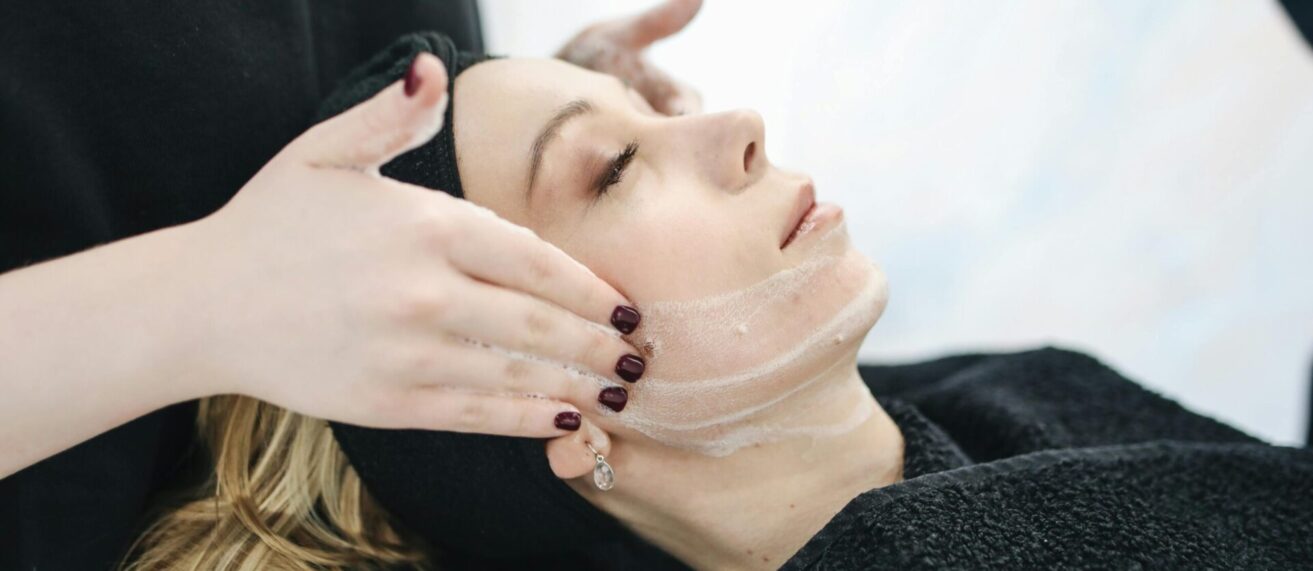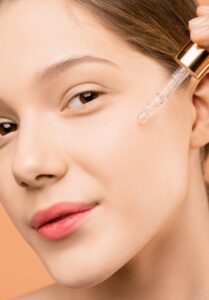
Nutrahara Blog
Nutrahara Blog
Sign Up For Our Wellness Newsletter!
Skin Care Options
Skin Care Options : Ingredients, Products, Vitamins, and Stem Cells
Taking care of your skin is an essential part of a good self-care routine. As you probably already know, the skin is the largest organ in the body, and it is the first line of defense against external factors such as sun damage, weather conditions, and pollution.
To be able to maintain healthy and glowing skin, it’s crucial to know what skin care ingredients to avoid, your skin care options, what products to use, skin care must haves, and how to develop a routine that fits your skin type and age. In this article, we will explore different skin care options, from homemade remedies to must-have products, and we will touch on skin care with stem cells, skincare and makeup and how they complement each other.
Firstly we’ll discuss the skin care ingredients to avoid when getting skin care products that best suit your skin.
Skin Care Ingredients To Avoid
Not all skincare ingredients are beneficial to your skin. Some ingredients can cause irritation, dryness, or even worse, breakouts. When shopping for skincare products, it’s essential to check the ingredients list and avoid the following:
- Parabens: They are commonly used as preservatives in skin care products. However, studies have linked parabens to cancer and hormone disruption (1). Avoid products that contain propylparaben, butylparaben, and methylparaben.
- Fragrances: Fragrances can cause irritation, redness, and allergic reactions, especially if you have very sensitive skin. Instead, opt for fragrance-free products to avoid getting any reactions.
- Sulfates: Sulfates are commonly used as a foaming agent in cleansers and shampoos. However, they can strip the skin of its natural oils and cause dryness, and makes you prone to irritation (2).
- Alcohol: Alcohol is commonly found in toners and astringents. It can cause dryness and irritation, thereby disrupting your skin barrier, especially if your skin is sensitive.
- Synthetic Colors: Synthetic colors are often found in skincare products to make them more visually appealing. However, they can cause skin irritation and allergic reactions.
Now, having discussed the skin care ingredients to avoid, here are some skin care products you should inculcate into your skincare routine.
What Skin Care Products Do I Need?
No more asking yourself what skin care products do I need. Here you have it. A good skincare routine should include the following products:
Cleanser
This is the number one skin care for beginners and experts. A cleanser removes dirt, oil, and makeup from your skin. Choose a gentle cleanser that doesn’t strip your skin of its natural oils. If you have oily or acne-prone skin, look for a cleanser that contains salicylic acid, which can help unclog pores. skin care with salicylic acid is the gold standard for many acne, blackhead, and oily-prone skin treatment (3).
Toner
Using a toner will help balance the pH of your skin and prepare it for the next steps of your skincare routine. Look for a toner that contains witch hazel, which can help reduce inflammation and redness.
Serum
A serum is a concentrated formula that targets specific skin concerns, such as fine lines, wrinkles, and dark spots. Look for a serum that contains hyaluronic acid, which can help plump and hydrate the skin.
Moisturizer
A skin care moisturizer hydrates your skin and locks in moisture. Look for a moisturizer that contains ceramides, which can help restore your skin’s natural barrier.
Sunscreen
Sunscreen protects your skin from hazardous UV rays that has the likelyood to cause skin cancer, sun damage, and premature aging. Look for a broad-spectrum sunscreen with an SPF of 30 or higher, and apply it every day, even on cloudy days.
Skin Care Vitamin E
Vitamin E is an antioxidant that protects the skin from damage caused by free radicals, which can lead to premature aging. It’s commonly found in skin care products, such as moisturizers, serums, and eye creams. Vitamin E can also help reduce inflammation, redness, and sun damage. If you’re looking for a vitamin E-rich skin care moisturizer, try the CeraVe Daily Moisturizing Lotion, which is suitable for all skin types and provides long-lasting hydration.
Skin Care With Salicylic Acid
Salicylic acid is a beta-hydroxy acid that is commonly used in skincare products for oily or acne-prone skin. It works by exfoliating the skin and unclogging pores, which can help reduce the appearance of blackheads and whiteheads. Skin care with salicylic acid can also help reduce inflammation and redness, making it a popular ingredient for those with sensitive skin. If you’re looking for a skin care with salicylic acid-based cleanser, try the Neutrogena Oil-Free Acne Wash, which is suitable for daily use and can help prevent breakouts.
Skin Care Moisturizer
A moisturizer is a crucial part of any skincare routine, as it helps hydrate the skin and prevent dryness and flakiness. Moisturizers come in many different formulas, such as creams, lotions, and gels, and they can be tailored to different skin types. If you have dry skin, look for a moisturizer that contains hyaluronic acid, which can help retain moisture in the skin. If you have oily skin, look for a lightweight, oil-free moisturizer that won’t clog your pores. One of the best moisturizers for all skin types is the Cetaphil Daily Hydrating Lotion, which is non-greasy and absorbs quickly into the skin.
What Are The Different Skin Care Options
When it comes to skin care, there are many different skin care options to choose from, depending on your skin type, age, and concerns. Here are some of the most popular skin care options:
Chemical Peels
Chemical peels are a type of exfoliation that uses acids to remove dead skin cells and promote cell turnover. They can help reduce the appearance of fine lines, wrinkles, and hyperpigmentation, but they should only be done by a licensed professional. They can be done on your face, neck, and hands. After a chemical peel, the skin becomes extremely sensitive to the and so you should always wear a sunscreen at all times (4).
Microneedling
Microneedling involves using a device with small needles to create tiny punctures in the skin. This can help stimulate collagen production and improve the appearance of scars, acne, fine lines, sun damage, and wrinkles. This process is also known as collagen induction therapy and most times, you may need about 4-6 procedures to notice any change (5).
Retinoids
Retinoids are a type of vitamin A that can help reduce the appearance of fine lines, wrinkles, and dark spots. They can be found in prescription-strength products or over-the-counter creams and serums.
LED light therapy
LED light therapy involves exposing the skin to different wavelengths of light to promote collagen production and reduce inflammation. It can be done at home with a handheld device or in a professional setting.
Natural Skincare Options Routine
If you prefer a more natural approach to skincare, there are many skin care homemade remedies that you can try. Here are some DIY skin care homemade recipes you could try:
- Honey face mask: Honey is a natural humectant, which means it helps retain moisture in the skin. To make a honey face mask, mix 1 tablespoon of honey with 1 tablespoon of plain yogurt and apply it to your face. Leave it on for 15-20 minutes, then rinse off with warm water.
- Coffee body scrub: Coffee grounds are a great exfoliant that can help smooth and soften the skin. To make a coffee body scrub, mix 1/2 cup of coffee grounds with 1/4 cup of coconut oil and 1/4 cup of brown sugar. Massage the mixture onto your skin in circular motions, then rinse off with warm water.
- Green tea toner: Green tea is rich in antioxidants that can help reduce inflammation and protect the skin from damage. To make a green tea toner, steep 1 green tea bag in 1 cup of hot water for 5-10 minutes. Let the tea cool, then pour it into a spray bottle and spritz it onto your face.
Skin Care Ingredients To Avoid During Pregnancy
If you’re pregnant or breastfeeding, it’s essential to be cautious about the skincare products you use, as some ingredients can be harmful to your baby.
Here are some ingredients to avoid during pregnancy:
- Retinoids: You do not want to be using retinoids when pregnant. Retinoids are a type of vitamin A that can be found in some anti-aging creams and acne treatments. High doses of retinoids have been linked to birth defects, so it’s best to avoid them during pregnancy.
- Salicylic acid: While salicylic acid is generally safe to use during pregnancy in small amounts, it’s best to avoid high concentrations of salicylic acid, such as those found in chemical peels.
- Hydroquinone: Hydroquinone is a skin-lightening ingredient that has been linked to fetal malformations and should be avoided during pregnancy.
- Phthalates: Phthalates are chemicals that are commonly found in fragrances and have been linked to developmental and reproductive toxicity. Look for fragrance-free products to avoid phthalates.
Skin Care In Your 30s
In your 30s, your skin starts to lose some of its elasticity and firmness, and fine lines and wrinkles may start to appear. To keep your skin looking youthful, here are some tips for skin care in your 30s:
- Use a retinoid: As mentioned earlier, retinoids can help reduce the appearance of fine lines and wrinkles. Start using a retinoid as a skin care in your 30s to help maintain your skin’s elasticity and firmness.
- Use a vitamin C serum: Vitamin C is a powerful antioxidant that can help protect the skin from damage and brighten the complexion. Look for a vitamin C serum to use in the morning before applying your skin care moisturizer.
- Wear sunscreen: Sun damage is one of the primary causes of premature aging, so it’s essential to wear sunscreen every day, even on cloudy days. Look for a broad-spectrum sunscreen with an SPF of 30 or higher.
- Stay hydrated: Drinking plenty of water can help keep your skin hydrated and prevent dryness and flakiness. Aim to drink at least 8 glasses of water a day.
What Are The Most Important Skin Care Must-haves?
While everyone’s skin care needs are different, there are some essential products that everyone should have in their skincare routine and are nonnegotiable. Here are some skin care must-haves:
- Cleanser: A gentle cleanser is essential for removing dirt, oil, and makeup from the skin.
- Moisturizer: A moisturizer helps hydrate the skin and prevent dryness and flakiness.
- Sunscreen: Sunscreen helps protect the skin from damaging UV rays, which can cause premature aging and skin cancer.
- 4. Exfoliator: An exfoliator helps remove dead skin cells and promote cell turnover, which can help brighten the complexion and reduce the appearance of fine lines and wrinkles.
Skin Care With Stem Cells
Stem cells are cells that have the potential to develop into different types of cells in the body, and they have become a popular ingredient in skincare products. Stem cells from plants, such as apples and grapes, are often used in skincare to help protect the skin from damage and promote cell regeneration. Some studies have shown that skin care with stem cells can help reduce the appearance of fine lines and wrinkles, but more research is needed to confirm these benefits.
Skin Care To Reduce Redness
If you have redness-prone skin, there are some steps you can take to help reduce the appearance of redness. Here are some tips for skin care to reduce redness:
- Use a gentle cleanser: Harsh cleansers can strip the skin of its natural oils and exacerbate redness. Look for a gentle cleanser that won’t irritate the skin.
- Use a moisturizer with niacinamide: Niacinamide is a form of vitamin B3 that can help reduce inflammation and redness. Look for a skin care moisturizer that contains niacinamide to help calm and soothe redness-prone skin.
- Avoid hot water: Hot water can cause the skin to become flushed and irritated, so it’s best to avoid hot water when washing your face or taking a shower. Use lukewarm water instead.
- Use a green-tinted primer or concealer: Green-tinted products can help neutralize redness and create a more even complexion. Look for a green-tinted primer or concealer to use under your foundation.
Skincare and Makeup
Skincare and makeup often go hand in hand, as makeup can be a great way to enhance your natural beauty and cover up imperfections. However, it’s important to make sure that your makeup isn’t causing damage to your skin. Here are some tips for skincare and makeup:
- Use non-comedogenic makeup: Non-comedogenic makeup won’t clog your pores and can help prevent breakouts.
- Remove your makeup before bed: Leaving your makeup on all through the night can clog your pores and cause you to breakout. Always ensure to remove your makeup before bed using a gentle cleanser.
- Use a primer: A primer can help create a smooth base for your makeup and help it last longer.
- Look for makeup with skincare benefits: Some makeup products contain skincare ingredients, such as antioxidants or hyaluronic acid, which can help improve the health and appearance of your skin.
Conclusion
In conclusion, taking care of your skin is an important part of maintaining your overall health and well-being. Whether you’re a beginner or a skincare expert, there is a wide range of skincare options available to suit your needs and preferences. By using the right skincare ingredients, such as vitamin E, salicylic acid, and stem cells, and avoiding harmful ingredients, such as retinoids and hydroquinone during pregnancy, you can help keep your skin looking healthy and youthful. Remember to always wear sunscreen, drink plenty of water, and be gentle with your skin, and you’ll be on your way to achieving a healthy, glowing complexion.
References
- https://www.scientificamerican.com/article/should-people-be-concerned-about-parabens-in-beauty-products/
- https://www.medicalnewstoday.com/articles/327013#:~:text=Sulfates+may+strip+away+too,health+from+using+sulfates+correctly
- https://www.nbcnews.com/select/amp/ncna1274542
- https://www.webmd.com/beauty/cosmetic-procedures-chemical-peel-treatments
- https://www.webmd.com/beauty/what_is_microneedling





